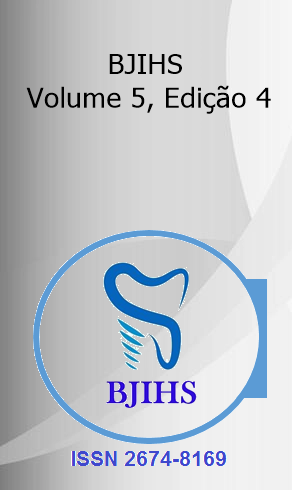Abstract
This is an integrative review of the literature. It was possible to structure the following guiding question: “What are the multidisciplinary interventions in patients with Attention Deficit Hyperactivity Disorder?” A survey was carried out through the electronic library, the Virtual Health Library (VHL), and the following databases were selected: Latin American and Caribbean Literature in Health Sciences (LILACS) and Medical Literatures Analysis and Retrieval System Online (MEDLINE ). With this, the descriptors consulted in the Descriptors in Science and Health (DeCS), in the month of September 2023, were used, being: “Attention Deficit Disorder with Hyperactivity”, “Patient Assistance Team” and “Mental Health”, with the descriptors in English so that there was a greater approach to studies using the Boolean operator AND between the descriptors when combined. After applying the eligibility criteria, a total of 8 selected articles were used. When we talk about dealing with people with ADHD, we also talk about dealing with interdisciplinarity, thus making other interventions necessary, including psychopedagogical interventions, focused on building conditions so that the person with ADHD can position themselves appropriately. , and pathological behavior takes a backseat. In summary, the treatment of ADHD needs to be multidisciplinary in order to obtain a good result in the quality of life of the sufferer. Using some therapies or medications in isolation, without multidisciplinary monitoring, may not be the best option for effective treatment.
References
ANDRADE, S. R. et al. O estudo de caso como método de pesquisa em enfermagem: uma revisão integrativa. Texto & Contexto. V. 24, n. 4, 2017. Disponível em: https://www.scielo.br/j/tce/a/8fLRLYFMZLVwT3BxBHCJRSs/?lang=pt. Acesso em: 05 de Agosto de 2023.
BRINKMAN, W. B. et al. Predictors of medication continuity in children with ADHD. Pediatrics, v. 141, n. 6, 2018. Disponível em: https://www.ncbi.nlm.nih.gov/pmc/articles/PMC6317545/. Acesso em 14 de set. 2023.
CHAN, E. Improving engagement in ADHD care. Peadiatrics. V. 148, n. 2, 2021. Disponível em: https://publications.aap.org/pediatrics/article/148/2/e2021050766/179773/Improving-Engagement-in-ADHD-Care?autologincheck=redirected. Acesso em 14 de set. 2023.
CASEY, T.; JOHSON, C. LOVE, D. Adult attention deficit hyperactivity disorder clinic: an interprofessional collaboration. J Am Pharm Assoc, v. 60, n. 5, p. 113-117, 2020. Disponível em: https://pubmed.ncbi.nlm.nih.gov/32616446/. Acesso em 14 de set. 2023.
CHEN, T. et al. Diagnosing attention-deficit hyperactivity disorder using artificial intelligence: a clinical study in the UK. Psychiatry, v. 14, 2023. Disponível em: https://www.frontiersin.org/articles/10.3389/fpsyt.2023.1164433/full. Acesso em 14 de set. 2023.
DASTAMOOZ, S. et al. The efficacy of physical exercise interventions on mental health, cognitive dunction and ADHD symptoms in children and adolescents with ADHD: an umbrella review. Clinical Medicine, v. 62, 2023. Disponível em: https://pubmed.ncbi.nlm.nih.gov/37599910/. Acesso em 14 de set. 2023.
MERRILL, B. M. et al. Improving homework performance among children with ADHD: a randomized clinical trial. Journal of Consulting and Clinical Psychology, v. 85, n. 2, p. 111-122, 2017. Disponível em: https://periodicos.unemat.br/index.php/rcc/article/view/3668/2949. Acesso em 14 de set. 2023.
PAGÁN, A. F. et al. Adult attention-deficit/hyperactivity disorder: a narrative review of biological mechanisms, treatments and outcomes. Curr Neurol Neurosci Rep, v. 23, n. 8, p. 451-460, 2023. Disponível em: https://pubmed.ncbi.nlm.nih.gov/37335460/. Acesso em 14 de set. 2023.
NOGUEIRA, L. R. M.; CORREA, M. J. S. Intervenção Multidisciplinas no transtorno TDAH. Revista de Comunicação Científica, v. 5, n. 1, p. 69-79, 2019. Disponível em: https://periodicos.unemat.br/index.php/rcc/article/view/3668/2949. Acesso em 14 de set. 2023.
OLIVEIRA, M. L. T. Os impactos dos sintomas do TDAH no adulto. Revista Brasileira de Ensino e Aprendizagem, v. 4, p. 26-46, 2022. Disponível em: https://rebena.emnuvens.com.br/revista/article/view/41. Acesso em 14 de set. 2023.
ROUGHAN, L. A. et al. Demand and capacity in an ADHD team: reducing the wait times for an ADHD assessment to 12 weeks. BMJ Open Qual, v. 8, n. 4, 2019. Disponível em: https://pubmed.ncbi.nlm.nih.gov/31750403/. Acesso em 14 de set. 2023.
SCHMITT, J. C.; JUSTI, F. R. R. A influência de variáveis cognitivas e dos TDAH na leitura de crianças. Psicologia: teoria e pesquisa, v. 37, 2021. Disponível em: https://www.scielo.br/j/ptp/a/NtVcRkpDGz5kwJnjKFBVPcC/. Acesso em 14 de set. 2023.
YONEK, J. et al. Key components of effective pediatric integrated mental health care models. JAMA Pediatr, v. 174, n. 5, p. 487-498, 2020. Disponível em: https://pubmed.ncbi.nlm.nih.gov/32150257/. Acesso em 14 de set. 2023.
SUÁREZ, E. V. et al. Evolution of children diagnosed with attention deficit/hyperactivity disord. Follow-up study in a Spanish simple. Gac Med Mex, v. 159, n. 3, p. 194-201, 2023. Disponível em: https://pubmed.ncbi.nlm.nih.gov/37494729/. Acesso em 14 de set. 2023.

This work is licensed under a Creative Commons Attribution 4.0 International License.
Copyright (c) 2023 Maria Eduarda Wanderley de Barros Silva, Samira da Silva Nojosa, Deisiele Gomes Santos, Tais Mireli da Silva Lira, Carlos Junior Gemaque Costa, Karla Renata Brito Perna, Muryllo Tavares Silva, Daniel Garcia Pimenta, Gabriel Pires de Pádua, Klecia Nogueira Máximo, Julio Cesar Pereira Silva

